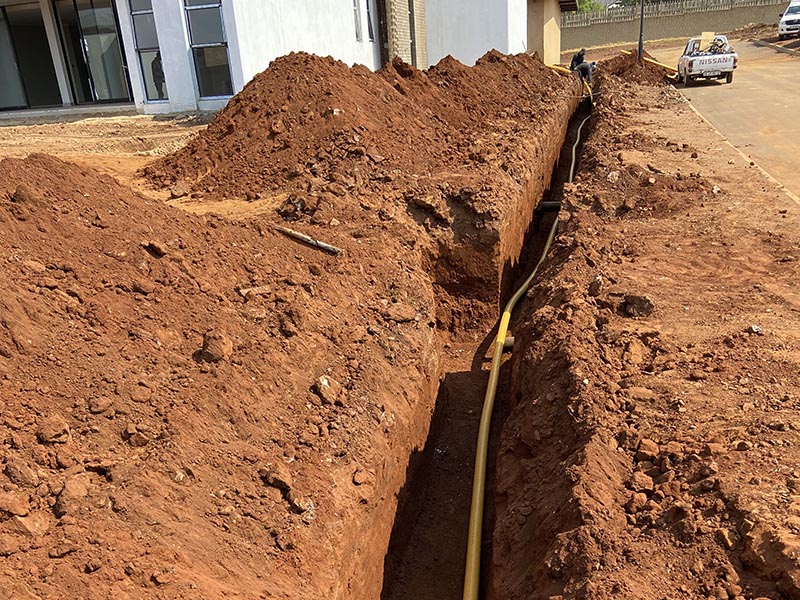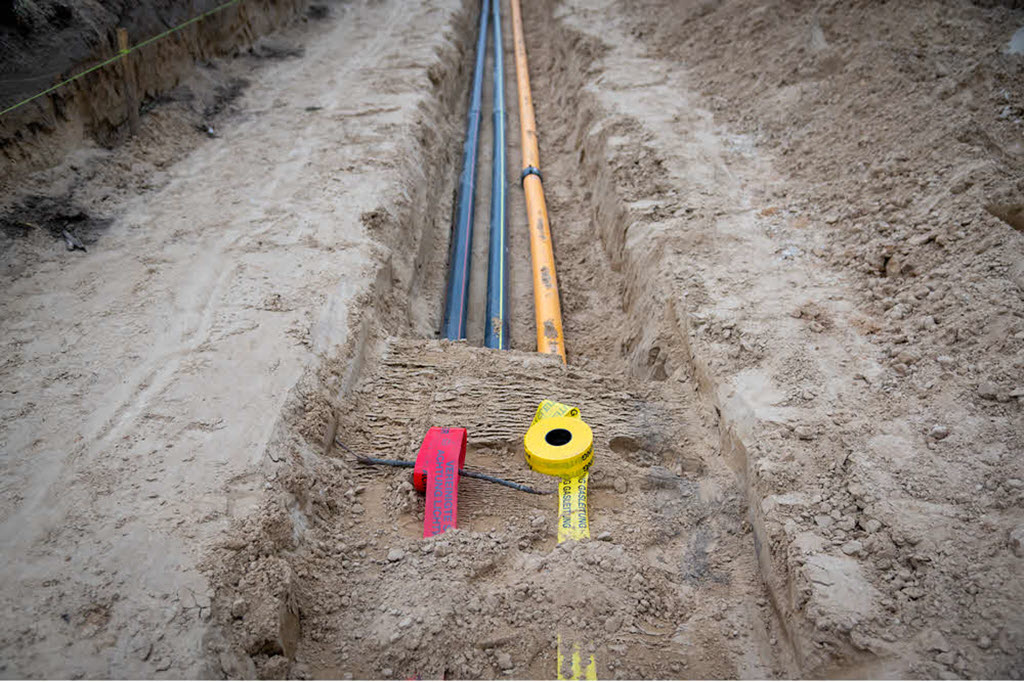Gas Line Servicesin Harrison Township MI
Safe and Efficient Gas Line Installation for Your Property
We Are Locally Owned & Operated For Over 37 Years
Contact Us Today!
We Serve Businesses In And Around The Following Cities:
About Gas Line Services
The Importance of Gas Line in Commercial Properties
Gas lines, often unacknowledged, form the lifeline of many commercial properties in Harrison Township, ensuring the proper functioning of various equipment from heating systems to fireplaces and grills. Given their massive significance and potential safety implications, understanding gas lines and their installation process can assure you a hassle-free, efficient, and safe environment for your property.
Understanding Gas Lines
Primarily, gas line refers to the pipeline system that transports natural gas or propane from the main city line or propane tank to your commercial property. These lines generally consist of durable materials, such as black iron pipes or copper gas lines, that withstand the high pressure of gas. However, certain specific commercial applications may necessitate a flexible gas line or flex propane gas line, also known as a CSST gas line.
Notably, the kind of gas line you choose depends on a variety of factors related to use, location, and state laws. Some industries prefer underground gas lines for aesthetic and safety reasons, while others opt for plastic gas lines to avoid corrosion. Regardless, consulting with experienced gas line installers, like D&J Contracting, can offer insight into the kind of gas line best suited for your commercial property.
Installation Process of Gas Lines
The process of gas line installation requires a blend of technical knowledge and stringent adherence to safety protocols. Depending on the type of gas line, an underground gas line or an indoor gas line, the installation process varies. It generally starts with a detailed inspection of the commercial property and the assessment of needs and compliance with Harrison Township’s building and safety codes.
Next, the gas line path is marked, considering future excavations and potential risk factors. After ensuring safety, the trenches are dug, the gas pipe is laid, and all joints are properly inspected and sealed. Post-installation, an extensive testing process is conducted to ensure no leaks and smooth gas flow. The gas line caps are a crucial component, ensuring the line’s secure end and preventing any potential gas leakage.
Benefits of a Professional Gas Line Installation
Hiring professionals like D&J Contracting for gas line installation can offer you numerous benefits. Experienced experts ensure adherence to safety protocols and local regulations and can guide you towards cost-effective and efficient solutions. Their deep understanding of gas line types, like the flexible natural gas line or the propane gas line, can be helpful in understanding what works best for your commercial property.
A professional gas line installation ensures seamless operation, minimizes potential leaks, and significantly reduces downtime. Moreover, the peace of mind offered with professionally installed gas lines ensures a safe, stress-free, and productive business environment, allowing you to focus more on your commercial operations and less on infrastructural concerns.
Real-world Applications of Gas Line Installation
Well-regulated and safe gas lines are essential for commercial properties such as restaurants, hotels, factories, and office buildings. For example, restaurants, with their extensive use of gas appliances like ovens and grills, require a proper gas line for bbq grill or natural gas line for grill. Similarly, hotels require a gas line for their heating systems and gas fireplace gas line for the fireplace.
Industrial factories often need various types of lines – from a propane line for specific machinery to a flex propane gas line for equipment requiring mobility. Even office buildings require gas line installations for their heating systems and fire pit gas line for recreational areas. Therefore, skilled gas line plumbers can play an essential role in ensuring smooth operation in commercial properties.
In business growth and sustainability, the nuances of gas line installation and its potential impact on your operations cannot be overstated. Professional gas line installations, regular maintenance, and timely checks can provide a solid foundation for your infrastructure. Ensuring your gas lines are in top-notch condition takes away worries about any unplanned disruptions, allowing you to focus on making your commercial endeavor an unconditional success.
Gas Line Services Gallery


Call Us Today to receive your Free Quote for
Gas Line in Harrison Township
Serving: Harrison Township, Michigan

About Harrison Township, Michigan
Harrison was first designated as the new centralized location of the county seat of Clare County in 1877. It would become a replacement for Farwell, which was the first county seat when Clare County was formally organized in 1871. The Flint and Pere Marquette Railroad platted the village in 1879 and set aside property for a new county government after the previous courthouse in Farwell burned down. The Harrison post office opened on January 27, 1880 and was named after former president William Henry Harrison. The new community incorporated as a village in 1885 and later as a city in 1891.
According to the U.S. Census Bureau, the city has a total area of 4.03 square miles (10.44 km), of which 3.71 square miles (9.61 km) is land and 0.31 square miles (0.80 km) is water.
The city’s motto is “20 Lakes in 20 Minutes” due its proximity to numerous lakes. Budd Lake is mostly located within the city limits, while the northern coastline extends into Hayes Township. The only other lake within the city limits is Little Long Lake, which also extends into Hayes Township.
 US 127 runs south–north just outside the eastern border of the city.
US 127 runs south–north just outside the eastern border of the city.
 Bus. US 127 is a business route of US 127 that runs through the center of the city.
Bus. US 127 is a business route of US 127 that runs through the center of the city. M-61 is a state highway that enters the west-central part of the city and then runs concurrently with Bus. US 127.
M-61 is a state highway that enters the west-central part of the city and then runs concurrently with Bus. US 127.
| Census | Pop. | Note | %± |
|---|---|---|---|
| 1880 | 129 | — | |
| 1890 | 752 | 482.9% | |
| 1900 | 647 | −14.0% | |
| 1910 | 543 | −16.1% | |
| 1920 | 399 | −26.5% | |
| 1930 | 458 | 14.8% | |
| 1940 | 727 | 58.7% | |
| 1950 | 884 | 21.6% | |
| 1960 | 1,072 | 21.3% | |
| 1970 | 1,460 | 36.2% | |
| 1980 | 1,700 | 16.4% | |
| 1990 | 1,835 | 7.9% | |
| 2000 | 2,108 | 14.9% | |
| 2010 | 2,114 | 0.3% | |
| 2020 | 2,150 | 1.7% | |
| U.S. Decennial Census | |||
As of the census of 2010, there were 2,114 people, 913 households, and 524 families residing in the city. The population density was 568.3 inhabitants per square mile (219.4/km). There were 1,306 housing units at an average density of 351.1 per square mile (135.6/km). The racial makeup of the city was 93.7% White, 1.7% African American, 0.8% Native American, 0.5% Asian, 0.2% from other races, and 3.1% from two or more races. Hispanic or Latino of any race were 2.5% of the population.
There were 913 households, of which 26.9% had children under the age of 18 living with them, 37.0% were married couples living together, 15.9% had a female householder with no husband present, 4.5% had a male householder with no wife present, and 42.6% were non-families. 37.2% of all households were made up of individuals, and 17.5% had someone living alone who was 65 years of age or older. The average household size was 2.18 and the average family size was 2.79.
The median age in the city was 42.1 years. 21% of residents were under the age of 18; 10.8% were between the ages of 18 and 24; 22.4% were from 25 to 44; 27.4% were from 45 to 64; and 18.4% were 65 years of age or older. The gender makeup of the city was 49.1% male and 50.9% female.
As of the census of 2000, there were 2,108 people, 857 households, and 526 families residing in the city. The population density was 563.3 inhabitants per square mile (217.5/km). There were 1,187 housing units at an average density of 317.2 per square mile (122.5/km). The racial makeup of the city was 94.78% White, 2.04% African American, 0.62% Native American, 0.71% Asian, 0.43% from other races, and 1.42% from two or more races. Hispanic or Latino of any race were 1.47% of the population.
There were 857 households, out of which 26.6% had children under the age of 18 living with them, 46.0% were married couples living together, 12.5% had a female householder with no husband present, and 38.6% were non-families. 35.2% of all households were made up of individuals, and 18.2% had someone living alone who was 65 years of age or older. The average household size was 2.24 and the average family size was 2.83.
In the city, the population was spread out, with 22.3% under the age of 18, 9.7% from 18 to 24, 25.6% from 25 to 44, 24.7% from 45 to 64, and 17.7% who were 65 years of age or older. The median age was 39 years. For every 100 females, there were 93.6 males. For every 100 females age 18 and over, there were 92.5 males.
The median income for a household in the city was $26,392, and the median income for a family was $35,179. Males had a median income of $32,500 versus $20,909 for females. The per capita income for the city was $15,443. About 14.1% of families and 18.5% of the population were below the poverty line, including 20.8% of those under age 18 and 15.1% of those age 65 or over.
The city of Harrison is served entirely by Harrison Community Schools, which is centrally located within the city and serves a large part of the northern portion of the county.
Mid Michigan Community College has a Harrison campus located just to the southeast in Hatton Township.
Call Us Today to receive your Free Quote for
Gas Line in Harrison Township
Related Services in Harrison Township, Michigan
We Serve Businesses In The Following Zip Codes:
48007, 48015, 48021, 48026, 48035, 48036, 48038, 48042, 48043, 48044, 48045, 48046, 48047, 48048, 48050, 48051, 48066, 48071, 48080, 48081, 48082, 48083, 48084, 48085, 48088, 48089, 48090, 48091, 48092, 48093, 48098, 48099, 48225, 48230, 48236, 48310, 48311, 48312, 48313, 48314, 48315, 48316, 48317, 48318, 48397